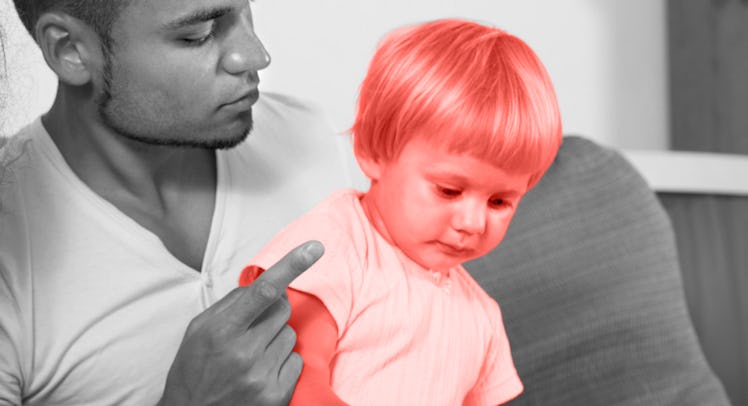How to Decide When to Ignore and When to Discipline Toddler Behavior
A toddler's bad behavior varies wildly. Here's how to find the right consequences for it.

The age between 12 and 26 months is a time of extreme change as toddlers make massive gains in cognitive understanding and language skills. As such, it is also a time of wild emotional swings and unpredictable behaviors. One second, toddlers are cuddly and kind. The next, they’re throwing tantrums, destroying household items, and throwing tantrums as if possessed. That makes it incredibly difficult for parents to choose which behavior to punish and which to take with a grain of salt and a boulder of empathy.
To be sure, much of toddler’s behavior is merely inconvenient. But the baseline for intervention is established when inconvenience becomes an actual danger. That’s when parents need to step in and institute some sort of punishment.
“Whether it’s at home, school, or a daycare setting, parents and teacher need to be active when there’s a threat of physical harm or injury to self or others,” says Dr. Norma Feshbach, a clinical and developmental psychologist and retired professor at UCLA.
The risk of bodily harm isn’t just limited to punching, biting, or kicking others. It includes dangerous behavior like running into the street or playing with hazardous materials like cleaning supplies. In those frightening situations, there’s an instinct to react harshly, sometimes by yelling or aggressively putting a child into time-out to think about what they did. Some parents even spank.
But Feshbach — who, along with husband Seymour Feshbach, spearheaded efforts to ban corporal punishment in public schools in the 1970s — cautions that punishments should veer from being harsh, and instead rest heavily on empathy. Toddlers are essentially sponges, and everything around them is informing the way they will grow to understand the world. If the consequence of physically hurting another child is to be physically harmed, or if they’re screamed at for screaming, then they’re likely to remain confused and continue to act out.
“Parents are the child’s model. If you’re using physical punishment, you’re really teaching children how to hit rather than reason,” says Feshbach. “Parents need to provide love, support, and structure through limits, boundaries, and verbal interaction.”
The approach to providing consequences for a toddler’s behavior varies as the child grows. A 12-month-old who is just exploring the world simply needs to be redirected when behavior escalates. In other words, they should be removed from the situation with a gentle explanation as to why. As cognitive skills develop and language emerges, that also means parents should be stepping up to provide a reason as to why a child is being put into time-out, removed from a play area, taken home early, or being denied their toys.
“I tend to encourage people to look at discipline as training children,” says Feshbach. “It’s socializing children, helping them grow up, rather than punishment. Punishment on its own doesn’t teach a child what’s right. It may teach them what’s wrong, but it doesn’t teach them the right behavior.”
The role parents take in modeling behavior is also instrumental in transferring the values they want a child to have, which can vary from household to household. This can be confusing to particularly social children. One family might think it’s adorable for a kid to sing a pop song about butts, while another might find it offensive. If the latter family is suddenly confronted by a PG-rated potty mouth, it’s important for them to explain why a child shouldn’t be saying those things and ensure they’re not said at home rather than to immediately fly off the handle over words. Consequences should be in place only if the toddler is showing parents they understand what the issue is.
Parents can also choose to ignore a child’s behavior if it seems silly or over the top, but that comes with the risk of making the toddler feel that their big feelings — and all toddler feelings are big feelings — are delegitimized. If a child is having a meltdown because her shoes are suddenly not the color she wants mid-walk, they still simply want to be heard, and an adult’s empathy can help them get through their own crisis. The worst thing a parent can do in these situations is combat a child’s feelings with aggression, frustration, or physicality. They should confront it, but with understanding.
“I think (ignoring bad behavior) is also destructive for the parent,” says Feshbach. “Using positive reinforcement means it takes longer, but you’re building a kid’s ego. Remind yourself that you’re teaching a kid how to resolve a problem.”
It’s a bumpy road, one full of trial and error. While big events like hitting, running into the street, breaking valuables, or playing with something dangerous are most likely to incur punishment and consequences, parents need to understand that sometimes the sheer volume of mood swings from a child might eventually lead a parent to crack and raise their voice. In an age of more parental sensitivity, it’s often glossed over that sometimes stress happens, and sometimes parents might mete out a time-out for something that doesn’t seem like too big a deal. But it’s all trial and error. Like toddlers, parents are learning too.
“Remind yourself: you don’t want to be a perfect parent. You just want to be a good parent,” says Feshbach. “Situations are always going to occur that you’re not prepared for, and it goes on forever. You can’t be a perfect parent. You just try to handle situations. The best combination is love and structure to help them grow up.”